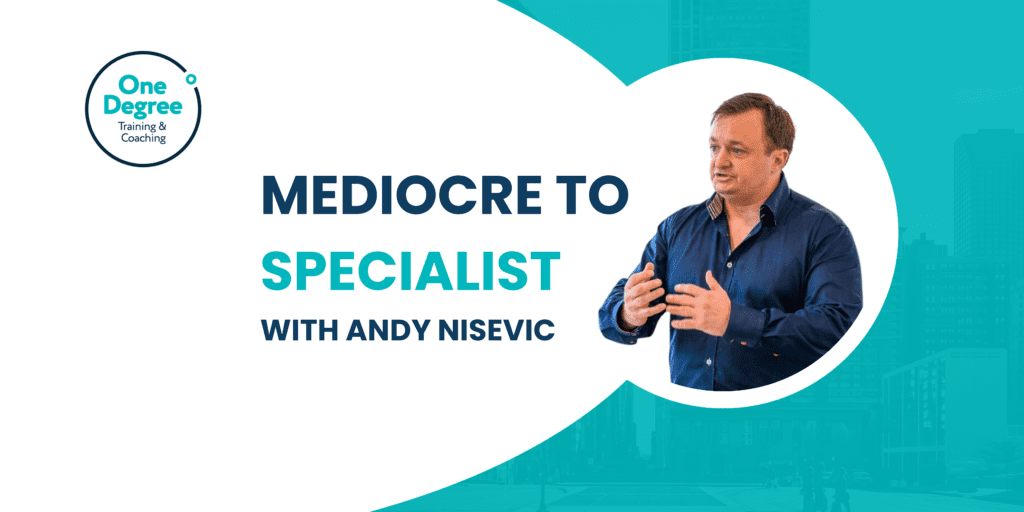Stop Being a Nice Leader

Wait! I can’t mean that, can I? Surely, if we’re not nice, we won’t create a cohesive team. Being a nice person comes with good intent. In fact, it comes with lovely intent. An intent to create a cohesive team, where people feel safe and welcome, able to talk about the things that are bothering them, etc. Here’s the problem with being nice. In my experience, the reality of being nice actually has the opposite effect. When a team member approaches a nice leader for help, the nice person will tell them exactly what they need to do, and where to go for the resources. Potentially, they’ll even do some of the work for them. This leads to a reliance on the leader to solve problems, rather than a team capable of independent thought and problem solving. A nice leader will accept a piece of work that’s below the required standards, and finish it themselves. This results in an under-appreciation of what the standards are, and stifles that individual’s growth & development. Someone who acts nicely in Leadership will use phrases along the lines of “my amazing team”, even though their performance is (at best) satisfactory. Again, this gives a false appreciation of what “amazing” looks like. During an annual appraisal, a nice leader will focus intently on where an individual has performed well and skip over the areas they need to improve. This over-inflates the sense of achievement for the individual making them believe they’re more capable than they are. This stunts their growth. What leaders need to do instead, is act with kindness. Kindness is having the difficult conversation with someone because it’s something they need to hear. Kindness is telling someone they’re underperforming and helping them to understand what the requirements are and how they can improve. When a team member approaches a kind boss with a problem, the boss will ask them how they would solve it and fill in any knowledge gaps. A kind leader will speak publicly about what the team is amazing at, whilst admitting where things can be improved. A kind leader will hold a performance appraisal, and while they will provide credit where it’s due, they’ll also ensure the individual knows what improvements need to be made if they want to fulfil their ambitions. Being nice is easy. It takes no time whatsoever and it maintains a level of harmony. Unfortunately, being nice doesn’t improve anything. In fact, being nice can cause a retrograde in performance until the harmony becomes false and tension starts to grow. Being kind is hard. It requires saying the things the other person needs to hear but doesn’t want to. Kindness creates uncomfortable situations and takes an investment in time. Kindness also creates independent, self-managing teams, who are multi-skilled and capable of high performance. Don’t be a nice leader, be a kind one instead.
10 Qualities of Great Mentorship

Good mentors, like good leaders, can have a lifelong impact on their mentees. A mentor is someone who’s an expert in the subject area, but it takes far more than expertise to be a good mentor. There is an abundance of research that demonstrates certain attitudes and personal qualities as being key. For example: Why is it important to have mentors? You are not only a role model and a leader, but you also have the knowledge and experience that others look up to and rely on for guidance. That’s a key motivator in itself – however, there are other compelling reasons to better yourself as a mentor. According to Gallup’s state of the workforce survey in 2022, employers who have an engaged workforce see a ~23% increase in revenue. Not only does mentoring develop skills within your team(s) it helps them feel engaged with and a priority. This leads to higher levels of fulfilment, increased performance, and better customer experiences. What qualities do all great mentors have in common? 1. Passionate about helping others. Cast your mind to a time where you were mentored well. The mentor will have made you feel as though you were a priority and they were passionate about your success. Great mentors will be ready with great advice, but it goes beyond that. They genuinely care of your success and will go out of their way to help you achieve it. If you’re in an industry that you don’t feel particularly passionate about, that’s ok. It’s the passion about help others achieve their goals that’s important. 2. A great communicator. This seems like an obvious one, but effective communication is essential for successful mentorship. Mentors need to be able to ask questions and offer advice in a way that’s easily understood by the mentee. Patience, active listening skills, curiosity, ability to answer questions, provide feedback, and help their mentees find solutions on their own, are all essential for a successful mentorship relationship. An effective mentoring conversation will see the mentor speaking for around 20% of the time. The other 80% will involve the mentee speaking and periods of quiet reflection to determine the best solutions or actions. Great communication is a skill in itself; if you find yourself struggling to hold perfect mentoring conversations, don’t worry, it takes practice. What’s important is that you’re there for your mentee. Start with open questions – what, when, where, which, & how – as they’re great initiating a 2-way conversation. “Why” also starts off an open question but should be used with caution. It can come across as argumentative, or accusatory. Visuals are another great way to enhance the quality of the communication. Drawing diagrams, graphs, pictures, etc., will help more visual people engage more. 3. Guide mentees to answers rather than just telling them. It’s incredibly tempting to tell people what to do, especially when you’re an expert and know the right answer. That’s not the best approach to mentoring. Great mentors acknowledge their biases and understand why something’s the right solution is more important that what the solution is. Using open questions, and helping the mentee determine the solution themselves, ensures the mentee will be independent, and not reliant on you to solve all their problems. This doesn’t mean you can’t share your experiences – you are the expert after all! But do so in a way that compliments their ideas, or leads them to the solution, rather than just telling them what to do. 4. Recognizes the value of mentorship for both the mentor and mentee. Being a mentor gives you far more than just the satisfaction of developing others. It gives you a chance to develop to. The great advantage of the younger generations at work, is their curiosity, creativity, and innovation. As you allow them to determine their own solutions, you’re exposed to ideas that your biases may never have let you come up with. Taking time to reflect on what you can take away from each conversation is essential to continually grow yourself. 5. Gives honest and candid feedback. Most people, if they’re honest with themselves, find giving constructive feedback difficult. It can be uncomfortable, and can risk tension in the workplace. It’s even harder to give when it’s someone you see on a regular basis. Patience, empathy, and a willingness to explain why that behaviour/decision/action was wrong, will help keep the relationship positive. When we allow ourselves to fall into the trap of “skipping over” the negative topics, we’re at risk of giving our mentee a false sense of their ability and progression. This can set them up for failure or mean they don’t advance. It’s incredibly important to be honest at all times. 6. Asks great questions. There’s a big difference between an open question and great questions. For example: “where do you see yourself in 5-yrs?”, is an open question, it’s also such a typical one that it tends to be met with basic answers. An approach such as: “imagine you’re 80-yrs old, where are you? What are you doing? What did you do to get there? From where you are now, what’s the next step you need to take to make that happen?”, tends to tap into possibility thinking and a more genuine connection with the process. As a mentor, curiosity, patience, and not needing to get to the point with one question is key to help your mentee become creative in their answers. 7. Shares their knowledge and experience. Everyone is inflicted with things like imposter syndrome from time to time. If that’s the case when you’re a mentor, you’re actually taking significant value away from your mentee. There’s a reason why you’re a mentor – especially if you were chosen by your mentee. You have valuable life experience, professional experience, and knowledge the mentee needs to develop and reach their full potential. Sharing your experiences and knowledge enriches the experience for the mentee and makes the process so much more personable. 8. Withhold judgment;
Quiet Quitting: A Poor Attitude, or a Failure of Leadership?

There has been so much talk about this concept of quiet quitting, or the great resignation, both in mainstream and social media. Lines have been drawn, sides have been taken, and teeth and claws are being sharpened! The question I like to ask though is, what’s the root cause? People on one side of the fence are blaming it on the “terrible attitude” of the workforce – how dare they just turn up to work, do the bare minimum and get paid?! The immediate point that springs to mind is if you pay someone minimum wage, what else can you expect? (I may have just given away which side of the fence I sit!) People on the other side of the fence say it’s a failure of leadership, that they’re not doing enough to support, develop and motivate their workforce. I say it’s nowhere near as simple as either argument. Now, if you assumed from my previous comment that I see it as a failure of leadership, you’re right, I do. But that doesn’t mean I blame them either. I believe it’s all too easy to forget the “humanness” of human beings. The one thing every single one of us has income, whether you’re in the 1% or the 99%, is we’re human beings. We’re all as fragile and emotional as each other. Some have learned to control their emotions more than others, but that doesn’t mean they’re not there. It also doesn’t mean that just because our emotions aren’t in the public view, that they don’t control how we behave towards people and the decisions we make. Our sub-conscious is an extraordinarily powerful feature of the human psyche. It’s a fantastic mechanism that allows us to interpret the world around us, but it has its downside. It’s where our emotion sits, this is where those unconscious behaviours – i.e., the facial expressions that we have no control over or idea that we’re pulling, or when we snap at people/overreact to situations – come from. These unconscious behaviours are often the reason we unknowingly sabotage our relationships with others, be that with friends or family, or with our colleagues at work. An unfortunate truth is the world we live is an incredibly difficult one, and it has been for years now. Let’s consider someone in a middle management position. They’re earning what could be described as a good wage. They’re good at their job and they’re an utmost professional. Unfortunately, earning a “good” wage – especially in the current climate – no longer guarantees a stress-free existence. This professional person, who consciously puts themselves into professional mindset in the workplace, still has those worries and stresses whirling around their subconscious. What effect is that having on their emotion, and subsequent unconscious behaviour? This is now where the effect is compounded. This person’s workforce will be detecting that energy in their subconscious, while also being a conscious recipient of the behaviours associated with such energy. This creates a divide, and over time, that divide grows and becomes distrust and disrespect. So, while the workforce (who by the way have all the same stresses in their own lives, possibly more because they’re on a lower wage) will be consciously professional, at an unconscious level they no longer have the motivation to perform for that manager. That lack of motivation results in unconsciously putting less effort in. Now consider the sheer number of people experiencing these difficulties, it’s no wonder the idea of quiet quitting, or the great resignation, is being talked about so widely. What’s the answer then? Unfortunately, there is no simple answer. As human beings we’re all motivated in different ways. But irrespective of what the individual answers are, it all starts with two things – effective communication & the ability to be vulnerable. If we’re able to be honest about our vulnerabilities, it drives connection as people can associate with them.
Work Less, Achieve More

There’s a belief that in order to achieve success, we need to work for it. While that may well be true, it often leads to an interpretation that it means working long, hard, hours. To be financially secure, some think tanks suggest that, in the 2020s, an annual household income of around £60k is needed (based on a 2 parent, 2 child dynamic). Whereas other studies suggest, that £60k per working adult is what’s needed to take away the stress and strains that money (or lack of it) brings. How many hours do you think you’d need to work to earn £60k? In 2024, the average national living wage will be £11.16. That means, to earn £60k on national living wage you’d need to work over 103 hours per week (nearly 15-hrs per day, 7 days a week!)! To earn £60k PA, based on a 40-hr working week, you’re looking at nearly £30 per hour. Suffice to say, financial comfort based on number of hours worked is not smart. The Pareto Principle tells us that 80% of our achievements come from 20% of our efforts. If taken as fact, that means that for every 5 days worked, only 1 of those days will actually drive us forward. 80% of our time is spent doing “busy work”, that has no real benefit. It’s this 80% work that leaves us feeling stressed & overwhelmed, with feelings that we can’t cope or we’re incapable. When we’re business owners who work by ourselves, this is one of the reasons we give up, or fail. If we’re business owners with employees, or managers within a business, it’s these emotions that lead to toxic environments that result in low productivity, high churn, etc. It’s very easy, when you’re a business owner, or senior person within a business, to try to solve these problems by working harder & longer. Sometimes this works, often though it becomes a vicious cycle that eventually leads to extremely difficult circumstances. What if people in those situations were to take a different approach? The phrase “work smarter, not harder” is often banded around with no real understanding of what it means. It’s not because people aren’t intelligent enough to understand how to work smarter, it’s because they’re so stuck in the middle of stress, that seeing the solution is almost impossible. The real solution appears when we stop. From an emotional perspective, this feels like a bad decision, but it’s important. When we stop, and take a step backwards, it gives us a broader perspective of what’s going on. It will allow us to see the decisions available to us: By asking ourselves these questions, we can analyse each answer to determine the how. I.e.: It won’t be easy, but if you’re finding yourself struggling to progress, it’s this type of thinking that will allow you to focus on the 20% that will help you achieve your ambitions. It doesn’t matter if your goal is to hit a certain income level (revenue or personal income), be promoted to a certain level, or to have more time to spend with the people you love, it’s focussing on the 20% that will ultimately make you successful. One Degree Training & Coaching Ltd are leadership development specialists for SMEs. We will give your managers the ability to develop teams capable of taking care of the 80%, so you can concentrate on the 20% that will achieve the results that will drive you forward.
Here’s how I went from mediocre to specialist…

How do you judge someone’s ability as a leader? Is it their ability to get results? What about their team members getting results? How do you determine whether the results are good? Do the team members hit their minimum goals, so can’t be classed as not getting the results, or do they over achieve? If they over achieve, is that because the levels were set too low to begin with, or because the team is excelling? Or, do you judge a leader’s ability based on something other than results? Employee happiness is one way, but are they happy because they’re never put under any pressure, or because they feel engaged and fulfilled with their work? Measuring a leader’s ability is tough! In my early days as a leader within the RAF, I was predominantly results focused. I felt that I must be a good leader, because I was getting results and further promotions, as were my team members. It wasn’t until later in my career that was I realised that I was managing, not leading. Management is important, as is getting the results. Ultimately, in business, if we don’t get the results needed, the business fails and people lose their jobs. We don’t need to look too far into the news though to see that results doesn’t always guarantee job security. When we focus on being a manager, rather than a leader, and if we’re lucky enough to have hardworking, self-motivated, people working for us, we will get results, but at what cost? When I look back at my early days as a leader (manager!) I realise that I relied on rank and goodwill to get the results. Those times that the goodwill wasn’t there became a real challenge. As a human being, I fell into the trap of self-protection and blamed the other person – “it can’t be me, everyone else on my team are doing well”, I would say to myself. The fact that I went into blame meant it became almost impossible to generate the goodwill. What I learned later on though was that there was no blame to be had, at all. The individuals concerned had no blame, nor did I. They were being them, I was being me, we just had conflicting personalities, communication styles, and internal motivators. What I lacked was the education, and understanding, about these differences and what I needed to do to ensure they didn’t become a barrier. It started with attending a Listening Skills Course, held by the Armed Forces Chaplaincy Centre. I’ll be honest, I didn’t really want to go, but it was mandatory for the role I was in, so I went. I can’t remember the specific conversation we were having, but something resonated with me. Understanding that communicating goes significantly deeper than just having a general conversation, passing instructions, and hearing what others have got to say, sparked a much deeper curiosity in human behaviour and psychology. It was this curiosity that led me on a developmental pathway that means I’m now able to call myself a leadership development specialist. It was all because I was lucky enough to not have a choice but to attend a course that, initially, I didn’t really want to go on. Human Beings are fascinating. We are both extraordinary and barking mad! Our tendency to self-sabotage, be it relationships or personal development, is mind blowing! As is our ingenuity, creativity and ability to love with passion. When we hold managerial responsibility and manage well, we get results. People are trained, targets are met, bonuses are received (hopefully!) and career enhancement may well follow. The downside is (unless we’re lucky enough to be doing a job we love) when we manage, everything – particularly are people challenges – is just hard work. It lowers our energy, our mood, our productivity, and sometimes our relationships. When we lead though, when we understand people at their core, we’re able to tap into their internal drives and motivators. We’re able to communicate with them in a way that excites them. When we’re able to do this, it doesn’t matter what the job is, we’re able to help our people feel engaged and fulfilled to want to put the hard work in to achieve great results. When we lead, and are led, while we might feel tired after putting a shift in, our energy remains positive. This means our mood remains positive, our productivity remains high, and our relationships become far greater than ever. This is what One Degree specialises in. We help managers become great leaders.
Title: 10 Inspiring Leadership Quotes to Guide Your Path

Ever worked for the most incredible leader? Ever seen someone on the TV and been inspired. Perhaps it’s someone in a film… Leadership for some can be a challenge. Finding inspiration and guidance is essential though. Whether you are a seasoned leader or just starting your journey, wisdom from those who have walked the path before can be invaluable. In this article, I’ve noted 10 (and this is only some) of my favourite leadership quotes. They can provide you with valuable insights and help you steer your leadership journey towards success. If you’d like even more of a steer, speak to me about how we can support. Simon Sinek’s quote beautifully encapsulates the essence of leadership. True leadership is not about power or control but rather a responsibility to nurture and support your team. By putting the needs of your team first, you create a culture of trust and empowerment. Peter Drucker reminds us that leaders are not passive observers but active creators of their destinies. Leaders who embrace change and innovation can shape their organisations’ futures and lead them to success. Warren Bennis emphasizes the importance of vision and the ability to turn that vision into actionable goals. Effective leaders inspire their teams by articulating a clear vision and then guiding them towards its achievement. Ronald Reagan’s quote reminds us that leadership is not about personal achievements but about empowering and inspiring others to excel. Leaders should focus on harnessing the collective potential of their team members. Leadership is often associated with visibility, but Andy Nisevic highlights the importance of humility. Effective leaders give credit to their team, fostering an environment where everyone can showcase their talents. Steve Jobs’ quote is a reminder for leaders to stay authentic and true to themselves. Effective leadership comes from within, and trying to imitate others can hinder your unique leadership style. Dwight D. Eisenhower’s words underline the importance of motivation and persuasion in leadership. When people are intrinsically motivated, they are more likely to perform at their best. Steve Jobs’ second appearance on our list reinforces the significance of innovation in leadership. Leaders should encourage creativity and seek new solutions to stay ahead in a competitive world. Winston Churchill’s quote teaches us the resilience required in leadership. Both success and failure are temporary, but the ability to persevere through challenges is what truly matters. Good leaders should embrace continuous learning and personal growth while guiding their teams to reach their full potential too. These 10 quotes offer profound insights and guidance. They remind us that leadership is not just about titles and authority but about empowering others, fostering innovation, staying authentic, and persevering through challenges. By taking heed of these quotes, you can enhance your leadership skills and inspire positive change in your organisation and beyond. If you’d like to know what it takes to take your leadership to the next level, let’s have a chat.
Welcome to One Degree Training and Coaching

Hi, I’m Andy Nisevic. After leaving a 23-year career in the RAF, and having recieved world leading training, and having been a leader in the RAF, I’ve combined my passion for helping people with my extensive knowledge of leadership skills to create programmes to share insights with managers outside of the military. I have worked with some fantastic leaders over the years. But I’ve also worked for some terrible ones. Something I’m sure you can relate to. Harnessing both the highs and lows of my experiences and blending them with scholarly theories and psychological principles, I have curated a range of innovative workshops and masterclasses to help businesses develop better leaders. This ultimately results in better business performance and happier teams. My mission is simple: to disseminate these insights and ensure leaders cultivate environments where every team member feels valued, understood, and inspired.

